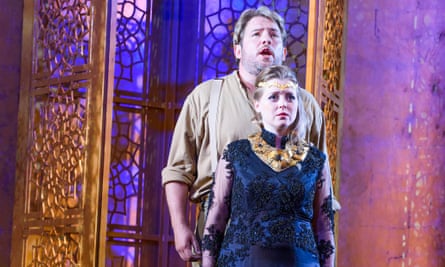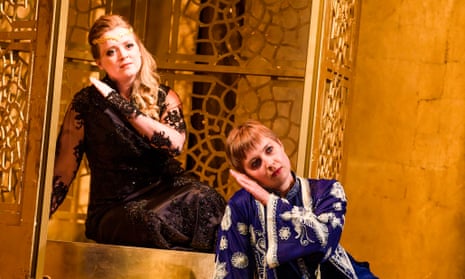Delibes’s Lakmé has notched more than 1,600 performances in Paris since its 1883 premiere, but it rarely crosses the Channel these days. That’s particularly odd, given the pop-classic status of the first act’s Flower Duet — best known as the music for the British Airways ad — and the enduring fame of the soprano’s Bell Song in the second act. Opera Holland Park deserves bags of credit for giving this elegantly crafted piece another UK airing, the company’s second in less than a decade.
Lakmé’s British Raj setting could easily lend itself to the kind of updated staging that is being visited in Rossini’s William Tell at Covent Garden. Instead, Holland Park’s new production is unambitiously content to take Lakmé on its own 19th-century orientalist terms. Many will find it a relief that the opera is not reimagined in post 9/11 Afghanistan, for instance. But the culture-clash love between the British officer Gérald and the Brahmin priest’s daughter, Lakmé, is so quaintly staged and kept in such relentlessly soft focus that the production is not just boring but in some respects offensive.
Musically, everything is at a consistently high level. Matthew Waldren conducts crisply and the City of London Sinfonia’s playing is full of good things. But the lack of variation and pace in Delibes’s writing is cruelly exposed by the decision to play the first two acts, each of which lasts an hour, without a break.

In the end, though, Lakmé stands or falls by the quality of the singing. In the title role, Fflur Wyn has the measure of the coloratura of the Bell Song, sustains the lyric line of the act one duet, ably abetted by Katie Bray’s Mallika, and finds the range of expression to make the scene of self-sacrifice truly affecting in the final act. Robert Murray makes a worthy partner as Gérald in the pair’s duets, his tenor always full of pleasing tone, while David Soar’s ringing bass does what it can with the two-dimensional writing for Lakmé’s vengeful father, Nilakantha.
- In rep at Opera Holland Park, London, until 31 July. Box office: 0300-999 1000

Comments (…)
Sign in or create your Guardian account to join the discussion